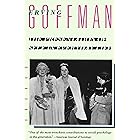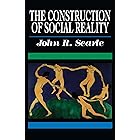Your Memberships & Subscriptions

Download the free Kindle app and start reading Kindle books instantly on your smartphone, tablet, or computer - no Kindle device required.
Read instantly on your browser with Kindle for Web.
Using your mobile phone camera - scan the code below and download the Kindle app.

OK
 Audible sample Sample
Audible sample Sample 


The Social Construction of Reality: A Treatise in the Sociology of Knowledge Kindle Edition

Explore your book, then jump right back to where you left off with Page Flip.
View high quality images that let you zoom in to take a closer look.
Enjoy features only possible in digital – start reading right away, carry your library with you, adjust the font, create shareable notes and highlights, and more.
Discover additional details about the events, people, and places in your book, with Wikipedia integration.
In this seminal book, Peter L. Berger and Thomas Luckmann examine how knowledge forms and how it is preserved and altered within a society. Unlike earlier theorists and philosophers, Berger and Luckmann go beyond intellectual history and focus on commonsense, everyday knowledge—the proverbs, morals, values, and beliefs shared among ordinary people. When first published in 1966, this systematic, theoretical treatise introduced the term social construction,effectively creating a new thought and transforming Western philosophy.
- LanguageEnglish
- PublisherOpen Road Media
- Publication dateApril 26, 2011
- File size1387 KB
Customers who bought this item also bought
Editorial Reviews
Review
From the Publisher
From the Inside Flap
From the Back Cover
About the Author
Thomas Luckmann (b. 1927) studied sociology at the University of Vienna and the University of Innsbruck in Austria before studying at The New School in New York. He has taught at the University of Konstanz in Germany, and Harvard, Yale, and Stanford Universities, among others.
Product details
- ASIN : B004X36R6G
- Publisher : Open Road Media (April 26, 2011)
- Publication date : April 26, 2011
- Language : English
- File size : 1387 KB
- Text-to-Speech : Enabled
- Screen Reader : Supported
- Enhanced typesetting : Enabled
- X-Ray : Enabled
- Word Wise : Enabled
- Sticky notes : On Kindle Scribe
- Print length : 162 pages
- Page numbers source ISBN : 0891975780
- Best Sellers Rank: #193,502 in Kindle Store (See Top 100 in Kindle Store)
- #17 in Humanism Philosophy
- #79 in Consciousness & Thought (Kindle Store)
- #107 in Cultural Anthropology (Kindle Store)
- Customer Reviews:
About the author

Peter L. Berger (Boston, MA) is University Professor of Sociology, Emeritus, at Boston University and the founder and Senior Research Fellow of the Institute on Culture, Religion, and World Affairs. He has written numerous books on sociological theory, the sociology of religion, and Third World development. Among his more recent books are In Praise of Doubt (with Anton Zijderveld); Religious America, Secular Europe? (with Grace Davie and Effie Fokas); Questions of Faith; Many Globalizations (edited with Samuel Huntington); and Redeeming Laughter: The Comic Dimension of Human Experience. Professor Berger has received honorary degrees from Loyola University, University of Notre Dame, University of Geneva, University of Munich, Sofia University, and Renmin University of China.
Customer reviews
Customer Reviews, including Product Star Ratings help customers to learn more about the product and decide whether it is the right product for them.
To calculate the overall star rating and percentage breakdown by star, we don’t use a simple average. Instead, our system considers things like how recent a review is and if the reviewer bought the item on Amazon. It also analyzed reviews to verify trustworthiness.
Learn more how customers reviews work on Amazon-
Top reviews
Top reviews from the United States
There was a problem filtering reviews right now. Please try again later.
“It will be enough, for our purposes, to define ‘reality’ as a quality appertaining to phenomena that we recognize as having a being independent of our own volition (we cannot ‘wish them away’), and to define ‘knowledge’ as the certainty that phenomena are real and that they possess specific characteristics.”
“It is our contention, then, that the sociology of knowledge must concern itself with whatever passes for ‘knowledge’ in a society, regardless of the ultimate validity or invalidity (by whatever criteria) of such ‘knowledge.’ And insofar as all human ‘knowledge’ is developed, transmitted and maintained in social situations, the sociology of knowledge must seek to understand the processes by which this is done in such a way that a taken-for-granted ‘reality’ congeals for the man in the street. In other words, we contend that the sociology of knowledge is concerned with the analysis of the social construction of reality.”
“The theoretical formulations of reality, whether they be scientific or philosophical or even mythological, do not exhaust what is ‘real’ for the members of a society. Since this is so, the sociology of knowledge must first of all concern itself with what people ‘know’ as ‘reality’ in their everyday, non- or pre-theoretical lives. In other words, commonsense ‘knowledge’ rather than ‘ideas’ must be the central focus for the sociology of knowledge. It is precisely this ‘knowledge’ that constitutes the fabric of meanings without which no society could exist.”
Two earlier writers on the sociology of knowledge cited by Berger and Luckmann are Karl Mannheim, Ideology and Utopia: An Introduction to the Sociology of Knowledge and Werner Stark, The Sociology of Knowledge: Toward a Deeper Understanding of the History of Ideas .
Berger himself is fluent in several languages. English is not his first language! Because of this language skill Berger is aware of "the linguistic shift that takes place in the nonverbal realm when moving from one language to another" as identified in by Bruce B. Lawrence in his book "Defenders of God." ISBN 0-06-250509-2. (See page 47 at the bottom for the quote. In other words, even from his youth, Berger could sense the way language change changes the way we sense the world. In other words, language is an "interpretive filter."
Note the word "sense" was used. It is more comprehensive than "understand."
One of the interesting points raised by the authors was whether it is possible for someone to ever fully socialize into a foreign culture, their primary socialization in their native land perhaps remaining predominant. And they provide an interesting interpretation of how social nonconformity arises: a clash between social norms and the content of a divergent primary socialization.
There are a number of deeper philosophical issues that the authors don't address, which is fine because this is a study of the workings of society and it has a practical bent. For instance the authors speak about identity as it's shaped by society, but not how the self a function of interaction with the Other. It's not an epistemological inquiry into how knowing is possible. It also doesn't delve into the underlying nature of human use of symbols--it just says that symbols make communal interaction easier. So "reality" is a bigger notion than what's covered in this book, but the book's insightful into how a particular and fundamental bit of "reality" is shaped.
The book is mostly jargon-free and readable. Sometimes the authors take a few pages to explain something they could cover in a paragraph, but on the whole it's not badly written.
Top reviews from other countries
Reviewed in India on April 8, 2022

Lecture indispensable, agréable et stimulante.
Quant à l'objet, la version "paperback" est tout à fait satisfaisante, portable et solide, même si le papier peut avoir un aspect un peu rugueux.













